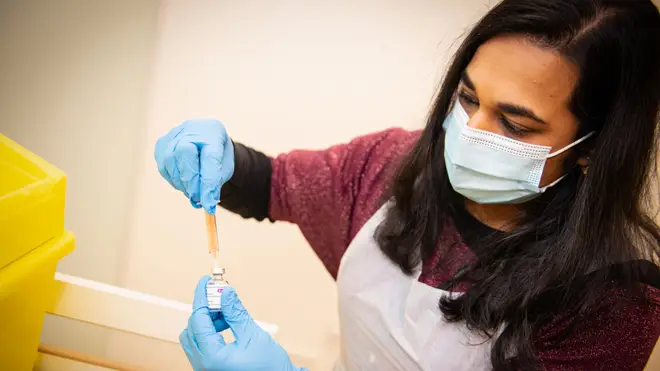
Lewis Goodall 10am - 12pm
1 April 2021, 10:01 | Updated: 1 April 2021, 12:05

Vaccine hesitancy among black British adults has decreased by half, according to the latest data from the Office for National Statistics.
Figures released today covering the period of 17 February to 14 March 2021, found around 1 in 5 (22%) black or black British adults reported hesitancy over having a Covid-19 jab.
This proportion has decreased by half from the previous period (44%), the ONS said.
READ MORE: France plunged into third national lockdown amid fresh Covid-19 wave
Overall, 6 per cent of adults reported hesitancy towards having a covid-19 vaccine in the period of 17 Feb to 14 Mar 2021.
This has fallen from 9% in the previous period (13 Jan to 7 Feb 2021). The ONS said an increased willingness to take the jab was a trend seen across most population groups.
More than 9 in 10 (94%) of adults reported a "positive sentiment" towards the vaccine.
The ONS defins hesitancy as adults who have refused a vaccine, say they would be unlikely to get a vaccine when offered and those who responded "neither likely nor unlikely", "don't know" or "prefer not to say" when asked.
Listen & subscribe: Global Player | Apple Podcasts | Google Podcasts | Spotify
ONS figures show than one in eight adults aged 16-29 reported vaccine hesitancy in the latest data period.
Eleven per cent of parents with a dependent child younger than five years old reported hesitancy, as did 12% of adults in the most deprived areas of England.
This compares to 3% of adults in the country's least deprived areas, the ONS said.
Vaccine hesitancy in each of the above groups decreased compared to when the same data was collected roughly a month prior.
Tim Vizard, from the ONS Public Policy Analysis division, said: "Over the past few months, we have seen attitudes across most of the population becoming more positive towards Covid-19 vaccination.
"However, there is still hesitancy among some groups, including young people, black or black British, and those living in the most deprived areas."